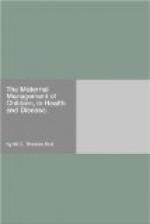As the child grows older, the quantity at each meal should be increased; the tops and bottoms changed for bread and pure milk, boiled or not; meat may be taken daily, except circumstances forbid it; and a small quantity of vegetable also.
If a child, then, be of a sound constitution, with healthy bowels, a cool skin, and clean tongue, the diet may be liberal, and provided it is sufficiently advanced in age, animal food may be taken daily. Too low a diet would stint the growth of such a child, and induce a state of body deficient in vigour, and unfit for maintaining full health: scrofula and other diseases would be induced. At the same time let the mother guard against pampering, for this would lead to evils no less formidable, though of a different character. And as long as the general health of this child is unimpaired, the body and mind active, and no evidence present to mark excess of nutriment, this diet may be continued. But if languor at any time ensue, fever become manifested, the skin hotter than natural, the tongue white and furred, and the bowels irregular, then, though these symptoms should bebonly in slight degree, and unattended with any specific derangement amounting to what is considered disease, not only should the parent lower the diet, and for a time withdraw the animal part, but the medical adviser should be consulted, that measures may be taken to correct the state of repletion which has been suffered to arise. For some time after its removal, care should also be taken to keep the diet under that, which occasioned the constitutional disturbance.
But if the child be of a delicate and weakly constitution (and this is unfortunately the more common case), it will not bear so generous a diet as the foregoing. During the three or four earliest years, it should be restricted chiefly to a mild farinaceous diet, with a small allowance only of meat on alternate days. The constant endeavour of the parent now should be, to seek to increase the digestive power and bodily vigour of her child by frequent exercise in the open air, and by attention to those general points of management detailed in the after-part of this chapter. This accomplished, a greater proportion of animal food may be given, and, in fact, will become necessary for the growth of the system, while at the same time there will be a corresponding power for its assimilation and digestion.
A great error in the dietetic management of such children is but too frequently committed by parents. They suppose that because their child is weakly and delicate, that the more animal food it takes the more it will be strengthened, and they therefore give animal food too early, and in too great quantity. It only adds to its debility. The system, as a consequence, becomes excited, nutrition is impeded, and disease produced, ultimately manifesting itself in scrofula, disease in the abdomen, head, or chest. The first seeds of consumption are but too frequently originated




